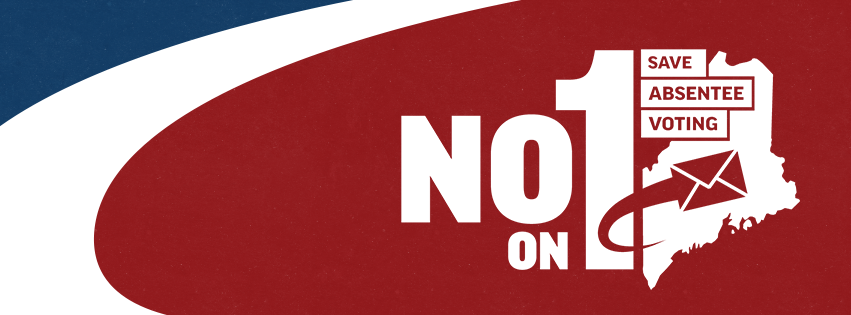Wabanaki Alliance Urges Voters to Reject Question 1 on Nov. 4

On November 4th, Maine voters will face a referendum question, Question 1, that seeks to fundamentally change Maine’s election laws and make it significantly harder for Wabanaki citizens and all Maine voters to cast their vote — especially our elders, people with disabilities, working voters, caretakers, and those without reliable transportation.
The Wabanaki Alliance is a proud partner of the Save Maine Absentee Voting campaign and stands in strong opposition to this measure, which would create unnecessary barriers to voting and disproportionately harm our citizens. For the Wabanaki Nations, the right to vote is sacred and the result of a hard-won battle by our ancestors. Voting rights weren’t extended to Wabanaki citizens in Maine until 1967, decades after federal voting rights for indigenous people were passed in 1924. Another deeply troubling aspect of this ballot measure is that it explicitly excludes Tribal Identification from the list of acceptable forms of voter ID. As federally recognized tribal nations, we value our tribal sovereignty and self-determination. This exclusion seeks to invalidate and undermine the ability to identify our people and have that authorization respected. As the original stewards of these lands and waters now called Maine since time immemorial, we find it imperative to assert this right and have it honored.
Question 1 is not a measure to secure our elections. It is a measure to suppress votes. The Wabanaki Alliance urges all Maine voters to vote NO on Question 1 this November to protect the right to vote for all Mainers.
How Will Question 1 Make It Harder to Vote?
Q1 will restrict your ability to request an absentee ballot by:
-
-
- Creating a voter ID requirement for the first time AND excluding Tribal IDs, university or college student IDs, employee IDs, Social Security cards, and birth certificates from the list of acceptable IDs required to request and return an absentee ballot or to vote in person on Election Day.
- Eliminating the option to call your town clerk to request an absentee ballot, making it harder for those without reliable transportation or internet to request an absentee ballot.
- Prohibiting town clerks from sending you an absentee ballot that you requested online until you provide proof of an approved photo ID, either in person or by mailing a photocopy of your photo ID or your driver’s license number or non-driver ID number.
- Eliminating ongoing absentee ballots for seniors and people with disabilities.
- Eliminating the ability for a designated family member or friend to pick up your absentee ballot on your behalf.
-
Q1 will make it harder for you to return your absentee ballot by mail or drop box by:
-
-
- Limiting towns to only offering a single ballot drop-box at the town hall. This would mean town clerks would be prohibited from providing absentee drop-boxes that are most convenient to where Wabanaki citizens live.
- Prohibiting towns from including return postage on absentee ballots, even if taxpayers vote to fund it.
- Requiring you to include a photocopy of an approved photo ID or your driver’s license number or non-driver ID number with your absentee ballot. Your vote will not be counted without that proof. The referendum also excludes Tribal IDs and other forms of valid ID from the list of acceptable IDs required to vote.
- Eliminating the ability for a designated family member or friend to return your absentee ballot for you.
-
Q1 will undermine the security of absentee voting by:
-
-
- Second-guessing town clerks, requiring a two-person, bipartisan team to check ballot boxes, instead of the clerk or a trusted member of their staff. This restriction will place undue pressure on town clerks, and will lead many towns to simply get rid of their secure drop-boxes.
-
Q1 will make it harder to vote in person, either on Election Day or by absentee ballot, by:
-
-
- Shortening the time period for early absentee voting by two days — eliminating the two most popular days for early absentee voting.
- Creating a voter ID requirement for the first time AND excluding Tribal ID, university or college student ID, employee ID, Social Security card, or birth certificate from the list of acceptable IDs required to cast their ballot.
-
Key Dates
✅ October 30: Last day to vote early in-person absentee and the last day to request an absentee ballot.*
✅ November 4: Election Day. Polls are open from 8 am to 8 pm. All absentee ballots must be returned to your town clerk by 8 pm.
Find your polling location here.
*You can still request an absentee ballot after the Oct. 30 deadline, but you’ll need to provide a valid excuse, such as a sudden illness or incident, physical disability, inability to travel, etc. Contact your town clerk for more information. Find your town clerk here.
The Ballot Question Reads:
“Do you want to change Maine election laws to eliminate two days of absentee voting, prohibit requests for absentee ballots by phone or family members, end ongoing absentee voter status for seniors and people with disabilities, ban prepaid postage on absentee ballot return envelopes, limit the number of drop boxes, require voters to show certain photo ID before voting, and make other changes to our elections?”

